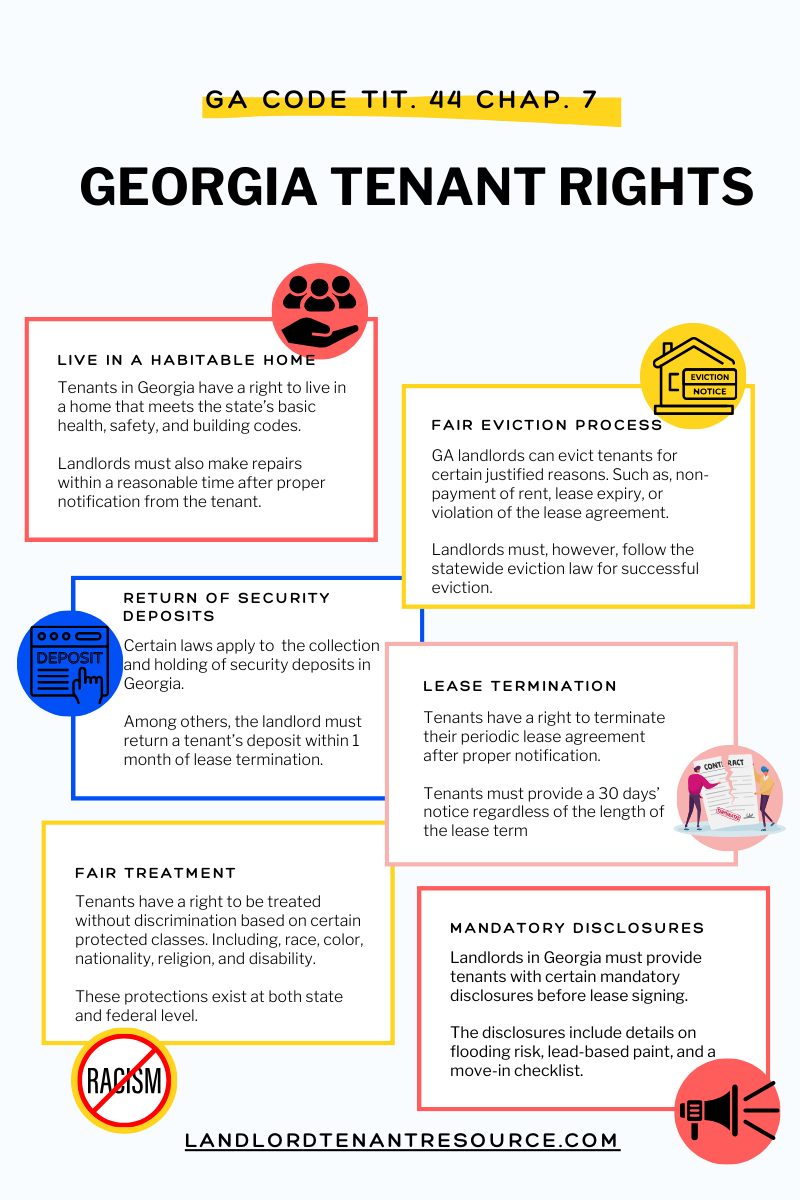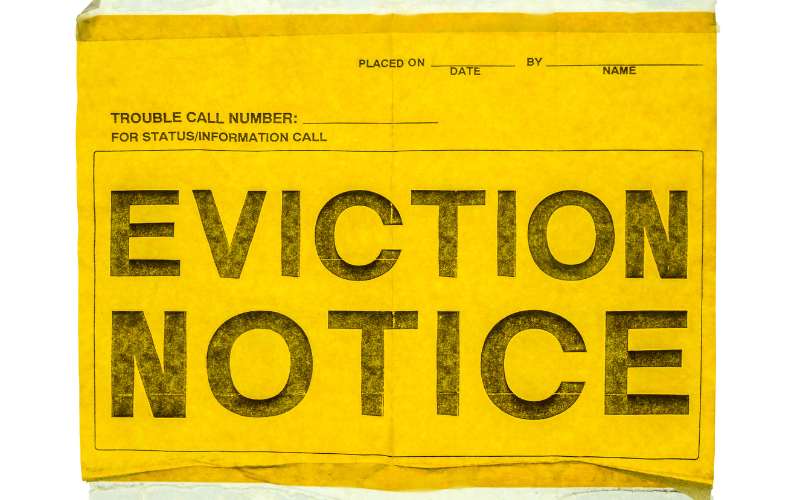As a landlord in Georgia, you have a right to evict a tenant for certain legitimate reasons. The following are some legally justified reasons for tenant eviction under GA Code Title 44 Chapter 7.
- Failing to pay rent on time when it becomes due.
- Failing to abide by the terms of the lease agreement, such as damaging the property beyond normal wear and tear.
- Committing an illegal activity, such as prostitution or drug dealing.
- Causing disruptive behavior, such as having loud parties or making threats.
- Not having a lease or failing to move out after the term of the lease is over.
Once you have any of these grounds, you must follow a certain series of steps to evict the tenant. You must not engage in illegal eviction methods, such as throwing out the tenant’s belongings or locking them out.
These “self-help” eviction methods are illegal and can land you in trouble with the authorities.
In today’s blog, we’ll walk you through everything you need to know when evicting a tenant in Georgia without a lease.
What is a Lease under Georgia Law?
Chapter 7, Title 44 of the Georgia Code defines a lease in either of three ways. One, if there is an oral agreement established between a landlord and a tenant. Here, the agreement is made entirely through spoken communication; there is no written contract.
Two, if there is a written agreement, establishing the terms of tenancy. Typically, landlords prefer this type of agreement for long-term leases.
In Georgia, a lease can also be legally binding if the landlord accepts a payment as rent.
With the lease established, both you and the tenant automatically obtain certain rights and responsibilities.
How do you evict a Tenant in Georgia without a Lease?
In a situation where a tenant doesn’t have a lease, you must still follow certain procedures to kick them out. You cannot engage in illegal eviction tactics as aforementioned.
The following is the step-by-step process you must follow to evict a tenant without a lease.
1. Serve the tenant with an eviction notice.
A tenant without a lease is referred to as a “tenant at will.” To start the eviction process against the tenant, you must first terminate their lease. As such, you will need to serve them with a 60-day notice to move out.
If the tenant fails to move on their own within this window, you may need to file an eviction lawsuit.
Please note that the service of the notice to the tenant must be done as per GA eviction laws. That is, it must be posted to the door of the property in a sealed envelope.
2. File a lawsuit in the appropriate court.
If the tenant doesn’t move out within 60 days, you can move to court and file a dispossessory warrant. After proper filing, the clerk of the court will then issue you with a copy of the summons and affidavit.
3. The tenant answers the complaint.
Tenants have up to 7 days to file an answer to an eviction complaint. They can do so either in writing or verbally.
The following are examples of answers the tenant may give in efforts to try to fight, delay, or stop their eviction.
- The tenant indeed had a lease.
- The eviction is a retaliatory tactic for exercising a legal right, such as reporting you to local authorities for habitability violations, for instance.
- The eviction is discriminatory because of the tenant’s race, color, religion, or any other protected class.
- The eviction process failed to follow the proper eviction process. For instance, you failed to provide the tenant with proper notice before filing an eviction lawsuit.
- The landlord used “self-help” eviction tactics against the tenant.
Without an answer, the court will have no other option but to render a default judgment in your favor.
4. Attend the court hearing.
Unlike some other states, Georgia doesn’t specify how soon an eviction hearing must be held after the tenant files an answer.
If the tenant fails to appear for the hearing, a default judgment will be issued by the court. At this point, the tenant will have no other option but to leave.
Hello, landlords. today we're going to talk about the four things you need to think about when you're filing an eviction in Georgia. Only four things matter. Let's get started.
So, over the last 12 years, I've taken a lot of cases to trial, and I've seen the things that win and I've seen the things that don't win. You know, it's not hard to see what it takes to be successful in an eviction. It's just these four things that I'm about to show you. But clients tend to want to dredge up everything.
Clients are convinced that for the court to make an adequate ruling, the court needs to know everything from way back in the beginning. So, I'm going to get started back in 1975. And that's the way many of my consultations start. And I, you know, I tend to stop people in their tracks and say, well, I don't know that we need to go back to 1975. Instead, let's talk about the operative facts that essentially make up an eviction case.
We don't need to talk about the person's character necessarily. It doesn't matter that they have a criminal history, again, unless it affects the operative facts of an eviction. None of that stuff is important. It doesn't matter that they called you a son of this or a mother of that.
Generally speaking, the tone of someone and the way they handle their conversation with you, yeah, it sounds bad, it makes for good television, but that's Court TV. The real world of eviction doesn't involve any of that stuff. And to bring it up really kind of invites frustration from the court, and it can have the effect of not just deflating your case but possibly jeopardizing the success of your case.
So, if you're going to present a case to the eviction court, stick to these next four things and only these. Really, it's all that matters in an eviction. The first is, does an agreement exist between you, the landlord, and this tenant? Generally speaking, there's a lease, and many times it's a written lease, so that's an easy question. It's an easy thing to prove, but that's not always the case. Some leases are oral only. Some people have agreements but they don't know that they have a lease.
To have a lease, you have to have the following: a basic agreement—in exchange for something, a person gets to live somewhere. Now, that something isn't always money. Sometimes somebody agrees to simply maintain the property, keep it in good repair, and in exchange, they get to live on the property.
And that's a lease. It's an agreement in exchange for a service for a place to live. And so, that lease agreement continues month to month, and every month that that person is carrying out that service, they have an agreement and the ability to stay put, and they're entitled to possession.
So, for you to be successful at your eviction trial, you have to prove that you have some sort of agreement, whether that's an agreement for money in exchange for possession or it's an agreement for service. You need to prove that agreement.
There may be a limited agreement of the friend who sleeps on the couch. This is an at-will tenancy, but it is a tenancy, and essentially the agreement is, for as long as I allow it, you get to stay in my house rent-free. But again, there is an agreement there, and upon disallowance, that agreement has ended. But even it may require the eviction court to be successful in an eviction. Establish what the terms of your agreement are.
Next, is there a breach of that agreement? For you to be successful in an eviction in a Texas court, you prove that not only did you have an agreement but that the terms of that agreement were violated. A violation of your agreement allows you, as the landlord, to demand possession.
So, if your written agreement spells out that certain acts, like non-payment of rent—the most popular one—constitute a default of your agreement and allow the landlord to terminate with notice that lease and recover possession, you've got the seeds for establishing your breach. The tenant failed to adhere to the agreement that you and the tenant entered into. That breach allows you to proceed with your eviction.
Landlords, as always, we welcome you to follow us on our Instagram page. If you're not a member yet, join us on Facebook. And if you enjoy what you see here, give us a thumbs up. Click that like button; we enjoy that very much. And if you haven't subscribed yet, please consider subscribing.
The third thing you have to prove is notice. Did you, the landlord, serve proper notice on the defendant by Georgia law? If you didn't give notice, you're not entitled to an eviction.
Even if you can prove that you had an agreement and you can prove that there was a breach of that agreement, failure to deliver proper notice means you can't proceed with your eviction. And again, it doesn't matter how good your evidence is on the other two points, you must also establish notice. In the state of Texas, you're required to give your notice to vacate in writing in advance of your eviction trial.
Generally speaking, a notice to vacate is for three days. You need to deliver it properly to a tenant. If you have multiple tenants who have signed a written agreement, it is advised that you serve each of those tenants.
Now, the law only requires you to give notice to one, but you must give notice to all of them. If that one tenant actually vacates, the other two tenants can say adequately that they were never actually notified.
So, it's always best if you have multiple tenants who signed a residential lease agreement that you serve each of them with notice. Be able to prove, for example, that you notified each tenant. One way to do it, the best way we believe, is by notifying each of those tenants at the premises in writing by regular and certified mail. You send a letter to each of them by regular and certified mail.
Keep your proof of mailing presented as evidence of your notice to the court, along with a copy of the substance of your notice demanding possession because of breach of the agreement that you had yourself with each of these tenants.
The last thing you need to prove is your damages. Now, note that it could be that this tenant owes you a thousand dollars in late fees alone or a thousand dollars in unpaid water utilities, or a thousand dollars in that security deposit that they never paid you. But none of these damages matter in an eviction, and that's just the plain hard truth. Your damages in an eviction lawsuit are limited. They're limited to non-payment of rent.
How much rent is owed to you through the date of trial? You calculate your damages based on exclusively unpaid rent. You can also recover your court costs, and if you have an attorney, you can recover reasonable and necessary attorney fees if your lease has a provision that awards reasonable and necessary attorney fees.
Or, if your lease does not have this, for example, if you have an oral lease agreement only, you could potentially recover your attorney's fees if you sent a 60-day notice with notice to the tenant. Number one, demanding possession. Number two, establishing the breach that you will claim that they committed in your event petition. Informing them that you will file an eviction and that in that eviction you will seek to recover any reasonable and necessary attorney fees if they fail to vacate by the 11th day. So, they have 60 days to get out. If, on day 61, they have not left, then yes, you can file your eviction petition and seek to recover reasonable and necessary attorney fees.
So, the next time you're bringing your eviction case to the eviction court, make sure you're limited to these four things: the fact of the agreement, the fact of the breach, the fact of your notice, and the fact of your damages. These are the only things that the court can even entertain in an eviction. So, mentioning anything outside of these facts doesn't help your case and could end up hurting your case.
5. Removal of the tenant.
In Georgia, a Writ of Possession is the tenant’s final notice to leave. Courts usually issue it 7 days after a successful judgment in favor of the landlord.
If the tenant refuses to leave even after being issued with the writ, the sheriff will have to evict them forcefully.
Frequently Asked Questions (FAQs): How to Evict a Tenant in Georgia Without a Lease
Q: What are Georgia tenant rights without a lease?
A: Even without a lease, Georgia tenants enjoy certain rights under state law. Here is a full breakdown of those rights.
Other rights that tenants in GA enjoy include the following.

Q: How long does it take to evict someone without a lease in Georgia?
A: How long it takes to evict someone without a lease in Georgia depends on several things. Including, the type of eviction you are carrying out, and whether the tenant puts up a fight against their removal.
But generally speaking, expect the process to take anywhere from 1 to 3 months.
Conclusion
Georgia landlords can evict tenants without a lease. However, the process must strictly follow the aforementioned process. You cannot try to lock out the tenant, remove their belongings, shut down their utilities, or engage in other illegal activities.
Sources: GA Code Title 44 Chapter 7, Federal Fair Housing Act, Self-Help Eviction
Disclosure: The content herein isn’t a substitute for advice from a professional attorney. It’s only meant to serve educational purposes. If you have a specific question, kindly seek expert attorney services.
Last Updated on May 25, 2024 by Kelvin Nielsen

I am a real estate attorney with over 11 years of experience in tenant eviction cases. My mission here at LTRC is to help answer your commonly asked questions on everything regarding real estate laws, especially on eviction matters.
I’m a member of the following professional organizations: Attorneys’ Real Estate Councils of Florida (ARECs), Florida Bar Real Property, Probate & Trust Law Section, American College of Real Estate Lawyers (ACREL), and the Florida Association of Community Managers (FACM).








